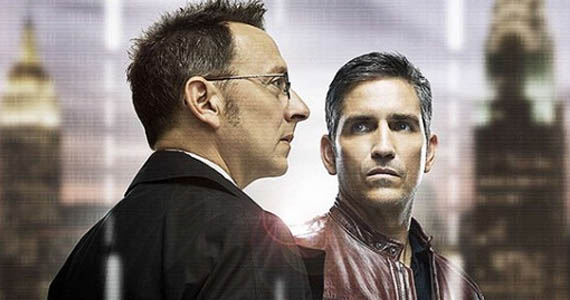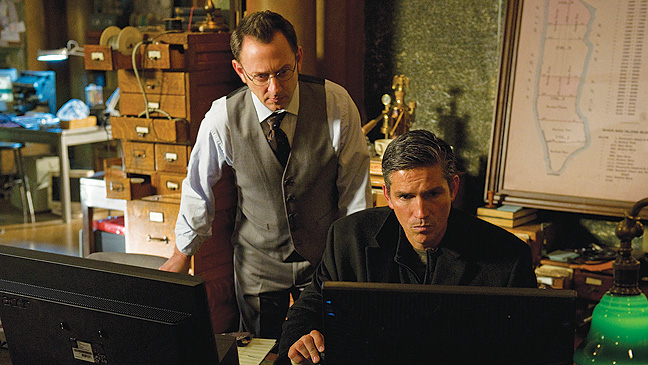 S01E01: A little over a year ago, a large community of Americans had to deal with the end of the only thing that had kept them going since 2004: LOST. In many of our lifetimes, there had not been a show that adequately mastered the illustration of the human condition in such an intimate way as well as creating a captivating mystery that was impossible not to think about all week between episodes. Since the series’ controversial end, the lot of us who adhered to the show have been waiting for something to come along that could mirror its whimsy; naturally, when we hear that LOST’s co-creator J.J. Abrams and its breakout star Michael Emerson are involved in a new show—a show about a machine nearly as mysterious as LOST’s island—we eagerly jump on board.
S01E01: A little over a year ago, a large community of Americans had to deal with the end of the only thing that had kept them going since 2004: LOST. In many of our lifetimes, there had not been a show that adequately mastered the illustration of the human condition in such an intimate way as well as creating a captivating mystery that was impossible not to think about all week between episodes. Since the series’ controversial end, the lot of us who adhered to the show have been waiting for something to come along that could mirror its whimsy; naturally, when we hear that LOST’s co-creator J.J. Abrams and its breakout star Michael Emerson are involved in a new show—a show about a machine nearly as mysterious as LOST’s island—we eagerly jump on board.
Person of Interest opens on John Reese (Jim Caviezel), a homeless alcoholic who is attacked on the subway by a crop of moronic hoodlums. Reese takes out the entire group of much younger and seemingly more able-bodied men with a martial arts style that Detective Carter (Taraji P. Henson), a policewoman investigating the incident, states “they don’t teach you in the regular army.” Carter is suspicious of Reese’s origins—and she is hardly the only one. Shortly after the incident, Reese is approached by the ominous Mr. Finch (Emerson), a wealthy man who wishes to utilize Reese’s skills to prevent crimes in New York City. Finch explains that he has a machine capable of pinpointing individuals who are soon to be linked (either as victim or villain) to a violent crime. By exposing the initially resistant Reese to a recording of a woman being murdered, Finch convinces the man to team up with him so that they may put a stop to criminal activity in New York.
The idea has merit. First of all, neither man is attached to the value of preserving human life simply out of the goodness of his heart. We learn slightly about Reese’s backstory in the pilot episode: we see flashbacks of him on vacation in Mexico with a girlfriend during the time of the September 11 attacks on the World Trade Center. As Reese has, at this time, just quit his job at “the agency” (the CIA, we find out) to devote his life to his girlfriend, we can wonder about where exactly his present grief comes from. Guilt in abandoning his position at the time of the tragedy? There are hints that he has lost someone—it is heavily suggested that his girlfriend was who he lost. Reese does, however, make mention of not “hav[ing] a family anymore” when threatened by one of the criminals Mr. Finch hires him to stop. Finch himself, a private but admittedly honest person (LOST fans will get a kick every time Finch promises that he “never lies”—Emerson’s Ben Linus was one of the biggest conmen in television history), states simply that he, too, has lost something.
 But even still, neither character seemed particularly rich. Granted, the pilot episode has the trying responsibility of establishing the plotline and explaining all the goings-on…a particularly big task in high concept shows like this one. Naturally, there is less time for character development. However, we must hope that there will be a more colorful illustration of these characters in epsiodes to come, as the mystery in this series is not gripping enough to be the show’s life-blood. We already know what the machine does: it reveals the social security numbers of individuals about to be involved in a crime. We know where it came from: Finch invented it. What we don’t know: how exactly it works. Now, from the get-go, this isn’t such an invigorating idea. Sure, it’s a question we’d like answered. But is it one worth tuning back in for? My hope, and expectation, for this aspect of the series is that further questions will be posed episode by episode. We need more to keep us going than just to see Reese solve episode-to-episode mysteries, clothesline quintets of armed men, and then head back to Finch for some ambiguous chatter (all peppered with some flashbacks of a Mexican vacation). What they gave us wasn’t bad, but it just wasn’t enough.
But even still, neither character seemed particularly rich. Granted, the pilot episode has the trying responsibility of establishing the plotline and explaining all the goings-on…a particularly big task in high concept shows like this one. Naturally, there is less time for character development. However, we must hope that there will be a more colorful illustration of these characters in epsiodes to come, as the mystery in this series is not gripping enough to be the show’s life-blood. We already know what the machine does: it reveals the social security numbers of individuals about to be involved in a crime. We know where it came from: Finch invented it. What we don’t know: how exactly it works. Now, from the get-go, this isn’t such an invigorating idea. Sure, it’s a question we’d like answered. But is it one worth tuning back in for? My hope, and expectation, for this aspect of the series is that further questions will be posed episode by episode. We need more to keep us going than just to see Reese solve episode-to-episode mysteries, clothesline quintets of armed men, and then head back to Finch for some ambiguous chatter (all peppered with some flashbacks of a Mexican vacation). What they gave us wasn’t bad, but it just wasn’t enough.
A big theme that the show is playing up is the watchful eye of the government. Heavy in Finch’s speech and in the camerawork is a focus on the ever-present Big Brother. If Abrams can make the U.S. government the ominous, mysterious monster that he made his island, then this show could have an invigorating, and possibly even genuinely edgy, narrative.
The series is not without its potential. It has the opportunity to play both on episode-by-episode crime exploits and the overarching stories of the machine; how Reese and Finch came to be in their respective positions,’the government; and plausibly a great deal more. In order to succeed, the show needs to enrich its characters and its mysteries further. It may never be as spellbinding as LOST (which, thanks to star and creator, it is bound to be compared to—I apologize for propagating that unfortunate analogy, but I roll with the crowd), although it could well be a worthwhile watch.
Final words: Person of Interest is interesting, but it needs more personality.



